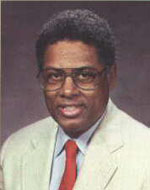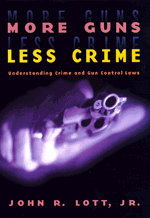|
|

Jewish World Review / June 30, 1998 / 6 Tamuz, 5758
Thomas Sowell
THE GENERAL ASSEMBLY OF THE PRESBYTERIAN CHURCH recently passed a resolution urging
all Presbyterians to keep handguns out of their homes. This resolution passed by a
three-to-one margin, but it is very unlikely that those who voted for it have studied the
empirical research on this subject.
The most recently published study is by Professor John Lott of the University of
Chicago's More Guns, Less Crime : Understanding Crime and
Gun-Control Laws (Studies in Law and Economics)
.
The number of states with new laws making it easier for the average citizen to get a gun
permit rose dramatically, from 8 states in 1985 to 31 by 1996. Moreover, the states
with the most rapidly growing numbers of people owning handguns have had the
greatest reductions in crime.
If Presbyterians follow the advice to remove handguns from their homes, they may
reduce the number of accidental shootings of family members. But these are very few
already and -- based on Professor Lott's study -- are likely to be more than offset by
increased numbers of murders by intruders.
Ultimately, this is not a matter of a difference in opinion or philosophy, but a matter of
empirical facts. Anyone who studies the many facts in John Lott's book will find it hard to continue believing the gun-control rhetoric that has
enjoyed a virtual monopoly in the media for years.
The crown jewel of the gun-control movement has been the Brady bill, which mandates
a waiting period for people wanting to buy guns and also mandates background checks
to keep criminals and crazies from becoming armed and dangerous. Background
checks are not an issue. They have long been supported by opponents of gun
restrictions, including the National Rifle Association.
Yet gun-controllers are whooping it up in the media because recent data indicate that
background checks have worked and this is supposed to show that the Brady bill as a
whole is a good thing.
But the other half of the Brady bill -- a 15-day waiting period -- is something else.
Professor Lott's statistical data indicate that waiting periods cost lives, rather than save
lives.
Liberals often assume that other people are irrational, so the idea behind a 15-day
waiting period is that these irrational people should not be able to get their hands on a
gun when they are angry and might do something they will regret. But there are also
quite rational reasons for wanting a gun, including a realization that you are in danger.
If so, you can be murdered before the 15 days are up -- as a number of people have
been.
Armed robbery is not nearly as much fun when the other guy is also armed. Shoplifting
or stealing parked cars may look like a better alternative to getting shot. Some criminals
may decide that even an honest job has possibilities.
Among the other facts to come out of this study is that a greater availability of handguns
especially reduces crimes of violence against women and blacks. Unfortunately, many
ghettos are in states with stringent restrictions against getting gun permits and heavy
penalties for having guns without permits.
The criminals, of course, have plenty of guns, despite these laws. With an estimated 200
million guns in the United States, it is hard to imagine how gun-control laws will disarm
anyone except law-abiding citizens.
If our real purpose is to reduce the number of lives lost on net balance, then it is just a
factual question as to what actually does that. Unfortunately, there are people for whom
gun-control crusades are part of a whole vision of the world that they are unwilling to
give up, or even to risk by looking at facts.
Professor Lott has learned the hard way that gun-control activists will denounce his
study in the media without ever having seen it. I could have told him that from long
years of personal experience on other issues, but this is his first book.
To gun-control advocacy groups, politics and power matter and facts don't. But if you
want the facts, read More Guns, Less
 When more is less
When more is less
 He found that murder rates went down after states passed laws making it
easier for law-abiding citizens to own and carry concealed handguns. Rates of other
violent crimes also went down.
He found that murder rates went down after states passed laws making it
easier for law-abiding citizens to own and carry concealed handguns. Rates of other
violent crimes also went down.
 Criminals are also quite rational. So it is hardly surprising that a spread of handguns
among the citizenry has been accompanied by both a decline in violent crimes and a
rise in non-violent crimes. Since criminals are in the business of committing crimes,
they adjust to changed conditions by changing their crimes.
Criminals are also quite rational. So it is hardly surprising that a spread of handguns
among the citizenry has been accompanied by both a decline in violent crimes and a
rise in non-violent crimes. Since criminals are in the business of committing crimes,
they adjust to changed conditions by changing their crimes.

6/29/98: Are educators above the law?
6/26/98: Random Thoughts
6/24/98: An angry letter
6/22/98: Sixties sentimentalism
6/19/98:Dumbing down anti-trust
6/15/98: A changing of the guard?
6/11/98: Presidential privileges
6/8/98: Fast computers and slow antitrust
6/3/98: Can stalling backfire?
5/29/98: The insulation of the Left
5/25/98: Missing the point in the media
5/22/98: The lessons of Indonesia
5/20/98: Smart but silent
5/18/98: Israel, Clinton and character
5/14/98: Monica Lewinsky's choices
5/11/98: Random thoughts
5/7/98: Media obstruction of justice
5/4/98: Dangerous "safety"
5/1/98:
Abolish Adolescence!
4/30/98: The naked truth
4/22/98: Playing fair and square
4/19/98: Bad teachers"
4/15/98: "Clinton in Africa
"
4/13/98: "Bundling and unbundling
"
4/9/98: "Rising or falling Starr
"
4/6/98: "Was Clinton ‘vindicated'?
"
3/26/98: "Diasters -- natural and political"
3/24/98: "A pattern of behavior"
3/22/98: Innocent explanations
3/19/98: Kathleen Willey and Anita Hill
3/17/98: Search and destroy
3/12/98: Media Circus versus Justice
3/6/98: Vindication
3/3/98: Cheap Shot Time
2/26/98: The Wrong Filter
2/24/98: Trial by Media
2/20/98: Dancing Around the Realities
2/19/98: A "Do Something" War?
2/12/98: Julian Simon, combatant in a 200-year war
2/6/98: A rush to rhetoric